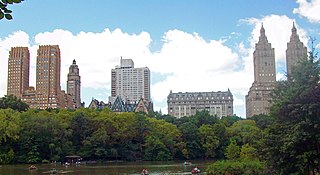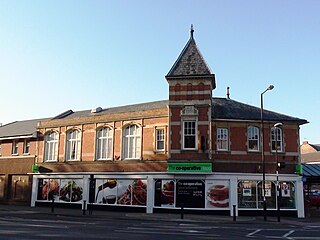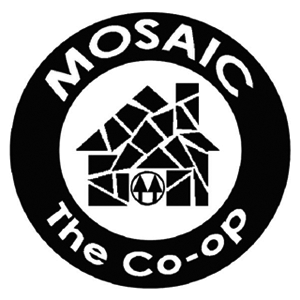Related Research Articles

A housing cooperative, or housing co-op, is a legal entity, usually a cooperative or a corporation, which owns real estate, consisting of one or more residential buildings; it is one type of housing tenure. Typically housing cooperatives are owned by shareholders but in some cases they can be owned by a non-profit organization. They are a distinctive form of home ownership that have many characteristics that differ from other residential arrangements such as single family home ownership, condominiums and renting.
The North American Students of Cooperation (NASCO) is a federation of housing cooperatives in Canada and the United States, started in 1968. Traditionally, NASCO has been associated with student housing cooperatives, though non-student cooperatives are included in its network. NASCO provides its member cooperatives with operational assistance, encourages the development of new cooperatives, and serves as an advocate for cooperatives to government, universities, and communities. NASCO teaches leadership skills, provides information, and serves as a central link in facilitating the fruition of the cooperative vision for students and youth.
Community of Urbana-Champaign Cooperative Housing, or COUCH, is an association of student housing cooperatives in Urbana and Champaign, Illinois. It is a member of North American Students of Cooperation (NASCO).
The Santa Barbara Student Housing Coop (SBSHC) is a student housing cooperative designed to provide affordable housing for students attending post-secondary institutions in Santa Barbara County. It is a member of NASCO. The first coop was established in 1976, and consists of five houses; Newman, Manley, Dolores, Biko and Merton. In all, just under 100 students live in these houses.
Subsidized housing is government sponsored economic assistance aimed towards alleviating housing costs and expenses for impoverished people with low to moderate incomes. In the United States, subsidized housing is often called "affordable housing". Forms of subsidies include direct housing subsidies, non-profit housing, public housing, rent supplements/vouchers, and some forms of co-operative and private sector housing. According to some sources, increasing access to housing may contribute to lower poverty rates.

The Inter-Cooperative Council at the University of Michigan (ICC) is a student owned and operated housing cooperative serving students and community members in Ann Arbor, Michigan. The ICC is an active member of NASCO.
The Berkeley Student Cooperative (BSC) is a student housing cooperative serving primarily UC Berkeley students, but open to any full-time post-secondary student. The BSC houses and/or feeds over 1,300 students in 17 houses and three apartment buildings. Food is provided to residents of the 17 houses, which also offer boarding meal plans to non-residents. As part of their rental agreement, residents of the houses are required to perform workshifts, typically five hours per week. The BSC is led by a board of directors which is primarily composed of and elected by student members.

A consumers' co-operative is an enterprise owned by consumers and managed democratically and that aims at fulfilling the needs and aspirations of its members. Such co-operatives operate within the market system, independently of the state, as a form of mutual aid, oriented toward service rather than pecuniary profit. Many cooperatives, however, do have a degree of profit orientation. Just like other corporations, some cooperatives issue dividends to owners based on a share of total net profit or earnings ; or based on a percentage of the total amount of purchases made by the owner. Regardless of whether they issue a dividend or not, most consumers’ cooperatives will offer owners discounts and preferential access to good and services.
A food cooperative or food co-op is a food distribution outlet organized as a cooperative, rather than a private or public company. Food cooperatives are usually consumer cooperatives, where the decisions regarding the production and distribution of its food are chosen by its members. Like all cooperatives, food cooperatives are often based on the 7 Rochdale Principles, and they typically offer natural foods. Decisions about how to run a cooperative are not made by outside shareholders, therefore cooperatives often exhibit a higher degree of social responsibility than their corporate analogues.
Davis Campus Co-ops (DCC) is a nonprofit organization whose mission is to provide low-cost cooperative housing for students attending University of California, Davis. Today, DCC owns one student housing cooperative called Pacifico Student Cooperative Housing, located in South Davis. In 2006, DCC partnered with the North American Students of Cooperation and the City of Davis to provide stronger cooperative education and management support. Governance of DCC is now coterminous with the NASCO Properties Board of Directors.

Cooperative economics is a field of economics that incorporates cooperative studies and political economy toward the study and management of cooperatives.
A student housing cooperative, also known as co-operative housing, is a housing cooperative for student members. Members live in alternative cooperative housing that they personally own and maintain. These houses are designed to lower housing costs while providing an educational and community environment for students to live and grow in. They are, in general, nonprofit, communal, and self-governing, with students pooling their monetary and personal resources to create a community style home. Many student housing cooperatives share operation and governing of the house. As with most cooperatives, student housing coops follow the Rochdale Principles and promote collaboration and community work done by the members for mutual benefit.

The Two Dickinson Street Co-op, or 2D, is one of the five student dining co-ops at Princeton University in Princeton, New Jersey. 2D is a 50-member vegetarian cooperative located across the street from the Princeton University campus.
Spartan Housing Cooperative (SHC) is a nonprofit member owned and operated housing cooperative. The SHC was formed as in 1969, as a federation of existing student housing cooperatives in East Lansing. Since the first of the SHC's member houses formed 69 years ago, SHC has accumulated more than 4,000 members.

Members of Society Acting in Cooperation (MOSAIC), also known as MOSAIC Co-op, is a housing cooperative in Evanston, Illinois, United States. It is the only housing co-op serving Northwestern University students, though it is not affiliated with the university.
CooperationWorks! is a network of organizations promoting rural development through the formation of cooperatives in the United States. CooperationWorks! is organized as a cooperative of 21 member development centers. The co-op facilitates the coordination of cooperative development efforts and provides business expertise to its member organizations.
The University of Texas Inter-Cooperative Council (ICC) is a student owned and operated housing cooperative serving students and community members in Austin, Texas. ICC Austin is an active member of NASCO.

The Oberlin Student Cooperative Association (OSCA) is a non-profit corporation founded in 1962 that feeds and houses Oberlin College students. Located in the town of Oberlin, Ohio, it is independent from but closely tied to Oberlin College. OSCA is one of the largest student housing cooperatives in North America, though membership has declined in recent years.

Students for Cooperation (SFC) is a co-operative federation of students in the UK. As a secondary co-op, the organization is owned and controlled by its constituent member co-operatives.
References
- ↑ NCDF Members
- ↑ Davidoff, Judith. Housing Co-op Wants to Grow. The Capital Times. 5 Feb. 2001.
- ↑ Tarr, Joe. Madison zoning redo could aid housing co-ops. Isthmus. 21 May 2009.